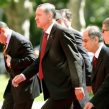
AKP Marshals E.U. Reforms to Normalize Civil-Military Relations
Publication: Eurasia Daily Monitor Volume: 6 Issue: 120
By:

On June 12, the liberal left Taraf daily published an unclassified document outlining an alleged action plan for the military to combat the "reactionary activities" against secularism. Allegedly the "Action Plan against Reactionaries (Irtica)," was prepared by senior staff Colonel Dursun Cicek and defines the ruling AKP and the Gulen movement as threats to the secular order in Turkey. The plan outlined various measures to undermine public support for the AKP and advocated a conspiracy against the Gulen movement to present it as an armed criminal group that could be construed as a terrorist organization (Taraf, June 12; EDM, June 15).
Since June 12, the Prime Minister Recep Tayyip Erdogan has intentionally avoided any confrontation with the Turkish military, while an insipid crisis has developed in Ankara. Instead of pursuing punitive action against the military authorities, Erdogan has exercised restraint and referred the matter to the courts (EDM, June 19).
However, as the criminal investigation deepens, both Gendarmerie forensic laboratories have found that that the signature on the action plan belongs to Colonel Cicek. The Turkish national police’s forensic lab has also corroborated this finding (Star, Taraf, June 19, 22).
In response to these developments the Turkish armed forces postponed the weekly press conference on June 19 (www.aktifhaber.com, June 19) and the Chief of the General Staff General Ilker Basbug told military officers not to speak to the media under any circumstances (Sabah, June 23). Erdogan, on the other hand, cancelled his program to visit Greece June 20 and his weekly address at his party meeting on June 22. Although the official explanation as to why Erdogan cancelled his program was due to his health, political observers tended to believe that the political crisis is the real reason (Taraf, June 22).
The recent developments which resulted in the current crisis in civil-military relations were unsurprising. In August 2008, an EDM analysis noted the fact that General Basbug views Islamic reactionaries (Irtica) as the chief threat to the nation-state structure and added:
"With regard to Irtica, domestic developments are against Basbug’s position. An overwhelming majority of Turks are sympathetic toward moderate Islamic government and moderate Islamic social networks and do not consider a threat to the state. In that area, Basbug has no public support. Basbug, who has a Western orientation, recently found himself in a political environment led by neo-nationalist movements unsympathetic to the West. Under the influence of these movements, Basbug went so far as to suggest that Turkey needed a "local bourgeoisie" that subscribed to protecting and maintaining the Turkish revolution (Milliyet, December 1, 2006). Political circumstances and international developments are not on Basbug’s side. If he insists on an isolationist political perspective and tries to use his power to replace the new middle class political figures with neo-nationalist politicians, he is likely to face political confrontation at best or political chaos at worst" (EDM, August 15, 2008).
Now the civil authorities are desperately trying to deal with the crisis. During at a luncheon hosted by the ambassadors of the E.U. member countries accredited in Ankara, Erdogan rejected the claims that there are tensions between the state institutions, i.e., the government and the military, and stated that the alleged plan has actually served as an occasion to display the confidence and loyalty of the Turkish people to the principles of democracy. "Almost the entire country unanimously defended democracy vis-à-vis the scenarios in this document. …Getting Turkey going off the rails of democracy and progress is never possible. Nobody has the sufficient power for doing so," Erdogan added (Today’s Zaman, June 23).
The Turkish media interpreted Erdogan’s statement as a commitment to implementing E.U. reforms more seriously and rapidly (Taraf, June 23). In fact, Erdogan during the luncheon assured the E.U. ambassadors that the necessary reforms will be passed before the parliament goes on holiday at the end of July (Star, June 23). Sweden’s Ambassador in Ankara Christer Asp, said that after the forensic experts determine whether the document is genuine, he is confident that the Turkish government will take action against the plan (Taraf, June 23).
It appears that the AKP government has finally realized that without pursuing the E.U. reform agenda it will prove difficult to normalize civil-military relations, even if there is consensus on various issues such as the Kurdish question. Yet the E.U. reform agenda is at a critical point, since Ankara also needs to address the Cyprus issue as well as reforming civil-military relations. Erdogan during his meeting with the E.U. ambassadors hinted that the AKP might mobilize public support, which is once again overwhelmingly gathered behind the government, in a renewed effort to pass the E.U. reforms.




